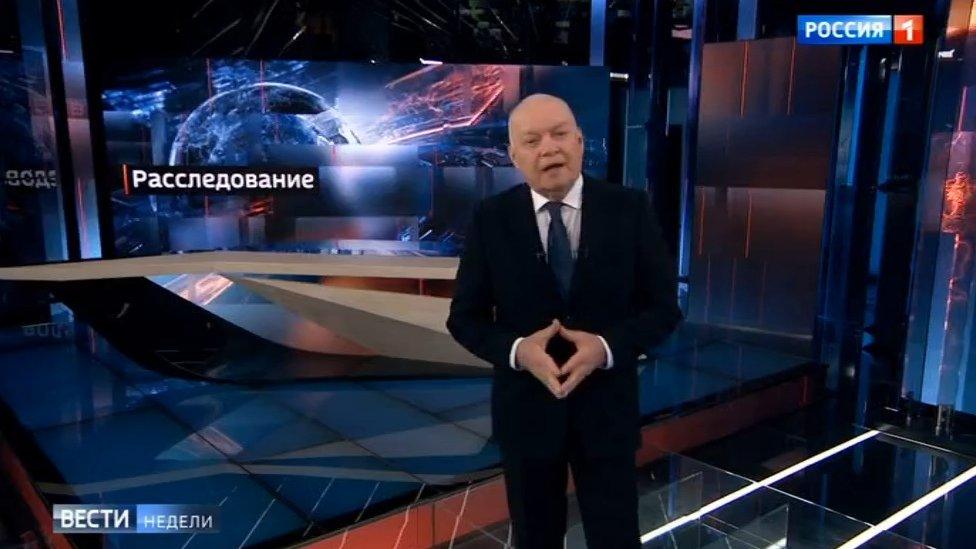Russian court charges four men with act of terrorism in Moscow attack
- Published
Watch: Russia attack suspects dragged into courtroom
Russia has charged four men it says attacked a Moscow concert hall and killed at least 137 people.
All four appeared to have been beaten and one was brought to court in a wheelchair. They were charged with committing an act of terrorism.
The Islamic State group, or IS, said it carried out Friday's outrage at Crocus City Hall and posted video evidence.
Russian officials have claimed, without evidence, Ukrainian involvement. Kyiv says the claim is "absurd".
On Monday - three days after the attack - Russian President Vladimir Putin told senior officials "we know that the crime was committed by the hands of radical Islamists, followers of an ideology that the Islamic world itself has been fighting against for centuries".
But he also insisted that the attackers were linked to the Ukrainian government. He had said so in his first reaction, on Saturday, claiming Kyiv had "prepared a window" to allow them to cross the border and escape into its territory.
Ukraine's President Volodymyr Zelensky angrily dismissed that claim, saying it was "absolutely predictable" that Vladimir Putin would blame it on Ukraine "instead of dealing with his Russian citizens, addressing them".
On Monday Mr Putin claimed Kyiv - what he called "the neo-Nazi regime" - was behind the attack because it wanted to "sow panic in our society and at the same time show their own population that all is not lost for the Kiev [Kyiv] regime".
Graphic video released by IS, showing attackers firing on the crowd inside the concert hall, has been verified as genuine by the BBC.
On Friday night, four gunmen stormed the Crocus City Hall in Krasnogorsk, a northern Moscow suburb, and began firing on some of the estimated 6,000 people who were attending a rock concert. The attackers also set fires which engulfed the venue and caused the roof to collapse.
Russian authorities said 137 people were killed and more than 100 injured, with 60 still in a serious condition.
Rescuers are continuing to search the rubble of the concert hall for victims, and regional officials said the operation would carry on through Tuesday afternoon.
The men who appeared in court on Sunday were arrested in the Bryansk region around 14 hours after the attack, Russia's Federal Security Service (FSB) said. Bryansk is around 400km (250 miles) south-west of Moscow.
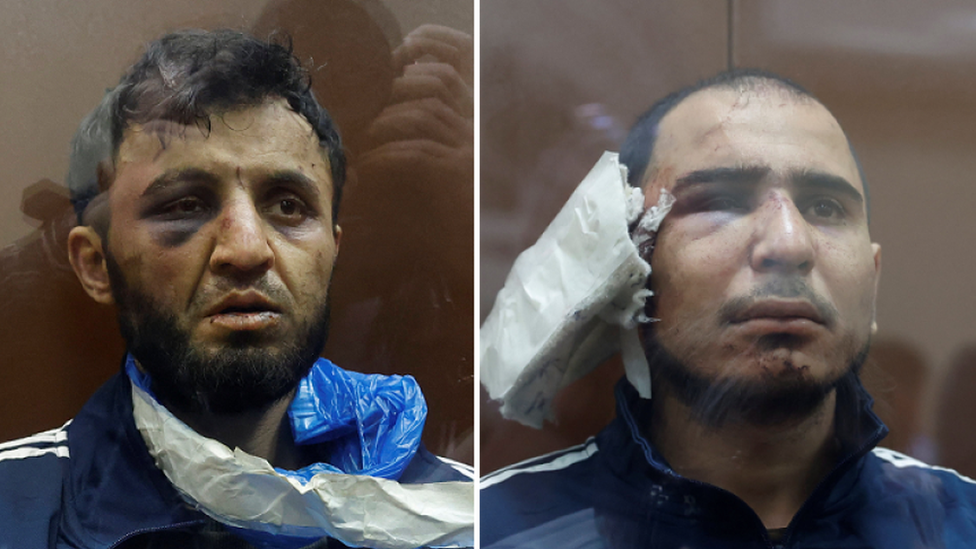
The men identified as Dalerdzhon Mirzoyev (left) and Saidakrami Murodali Rachabalizoda
The four suspects were named by Russian authorities as Dalerdzhon Mirzoyev, Saidakrami Murodali Rachabalizoda, Shamsidin Fariduni and Muhammadsobir Fayzov.
Video showed three of them being marched bent double by masked police into Basmanny district court in the Russian capital.
Videos of brutal interrogation sessions were apparently leaked by Russian security forces, and reports suggest at least one had suffered electric shocks.
Asked about the alleged torture, Mr Peskov refused to comment.
The men the court identified as Mirzoyev and Rachabalizoda had black eyes and the latter's ear was heavily bandaged - reportedly from it being partially severed during his arrest.
Mirzoyev also appeared to have a torn plastic bag wrapped around his neck.
The face of the man identified as Fariduni was badly swollen, while the man named as Fayzov appeared to lose consciousness as he was brought into court in a wheelchair wearing a thin hospital gown.
He appeared to have an eye missing, according to the Reuters news agency.
All were held in a glass-panelled booth and guarded by masked police during their time in court.
A court statement on the Telegram messaging service said Mirzoyev had "admitted his guilt in full", while Rachabalizoda also "admitted guilt". The court also said the four will be held in pre-trial detention until at least 22 May,
The men were identified as citizens of Tajikistan, Russia's state news agency Tass said.
Ten other people have been arrested in Russia suspected of aiding the attack, including three on Monday afternoon.
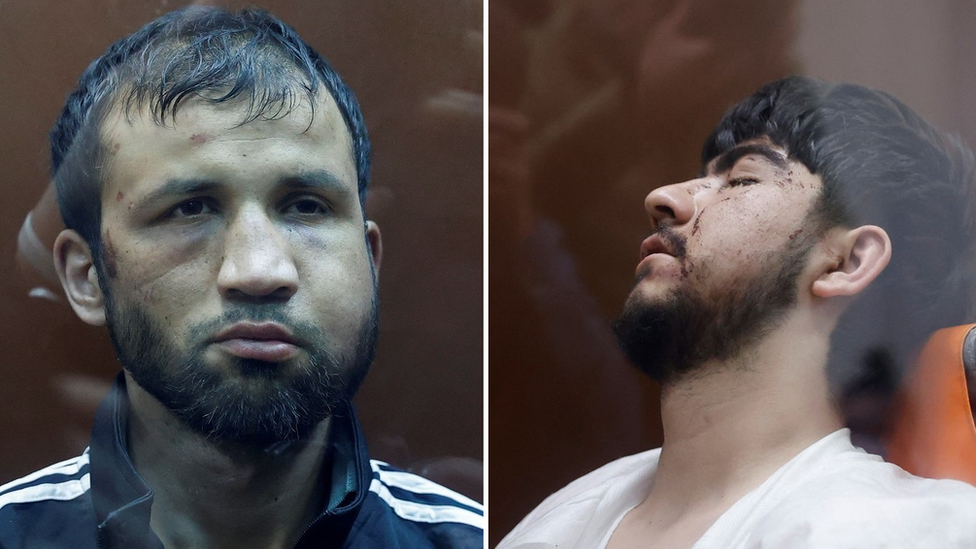
The men identified as Shamsidin Fariduni (left) and Muhammadsobir Fayzov
Russia in IS crosshairs
The US warned Moscow earlier this month of a possible attack in Russia aimed at large gatherings before issuing a public advisory to citizens in the country.
The alert was roundly dismissed by the Kremlin as propaganda and an attempt to meddle in its presidential election.
Washington said after the attack that it had no reason to doubt the IS claim.
It would not be the first time IS and its allies have attacked Russia or its interests abroad.
The group claimed the bombing of a Russian aircraft over Egypt in 2015 with 224 people on board, most of them Russian citizens. It also claimed a 2017 bomb attack on the St Petersburg metro, which killed 15 people.
Security analysts say the group considers Russia a primary target for a number of reasons, including the country's role in destroying IS's powerbase in Syria while securing President Bashar al-Assad's rule, Moscow's two brutal wars in Muslim-majority Chechnya in 1994-2009 and the Soviet-era invasion of Afghanistan.
The US and other Western intelligence agencies have said the attack was probably carried out by the Khorasan branch of IS, known as Isis-K, which chiefly operates in Afghanistan and parts of Central Asia.
It is among the most able and active of the IS offshoots, and was responsible for deadly suicide attacks at Kabul airport during the chaotic American withdrawal of August and September 2021.
Isis-K frequently criticises President Vladimir Putin in its propaganda.
Related topics
- Published24 March 2024
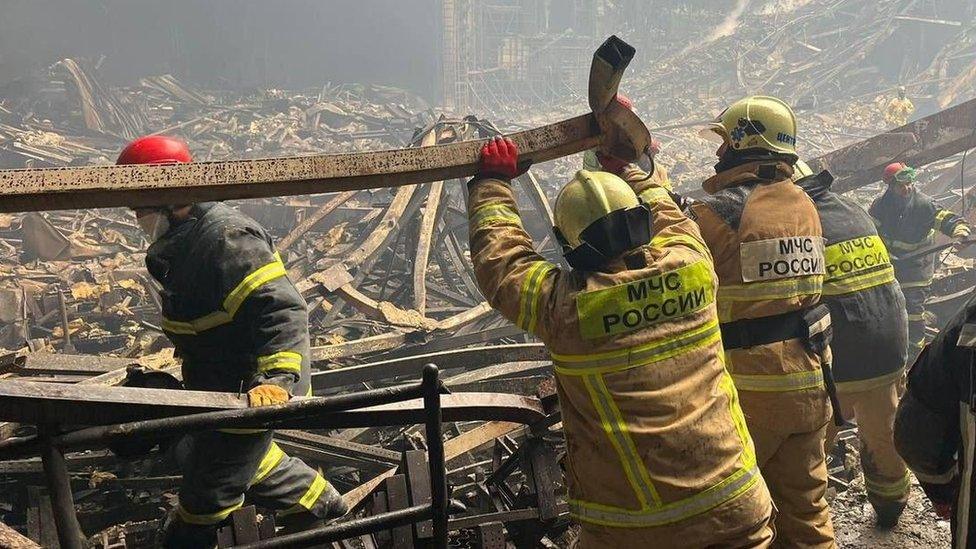
- Published24 March 2024
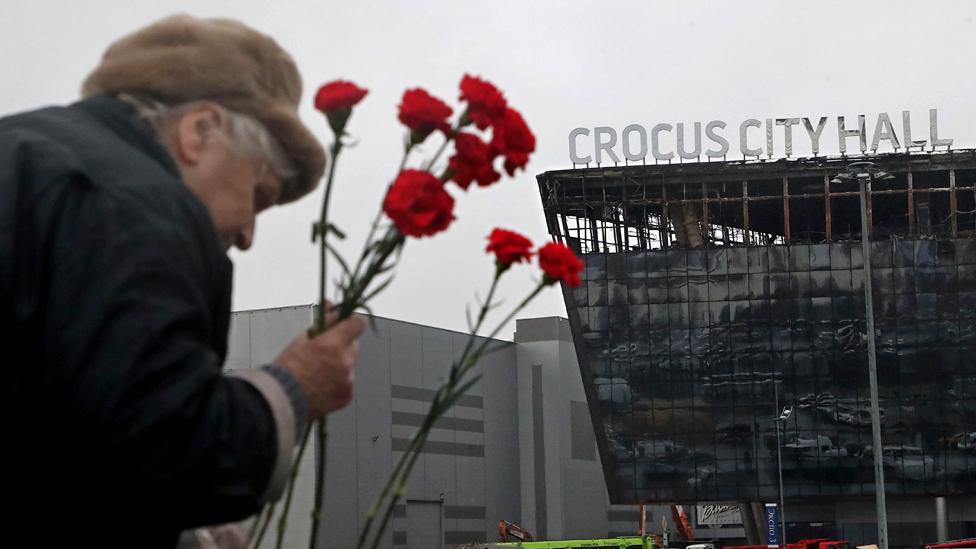
- Published25 March 2024
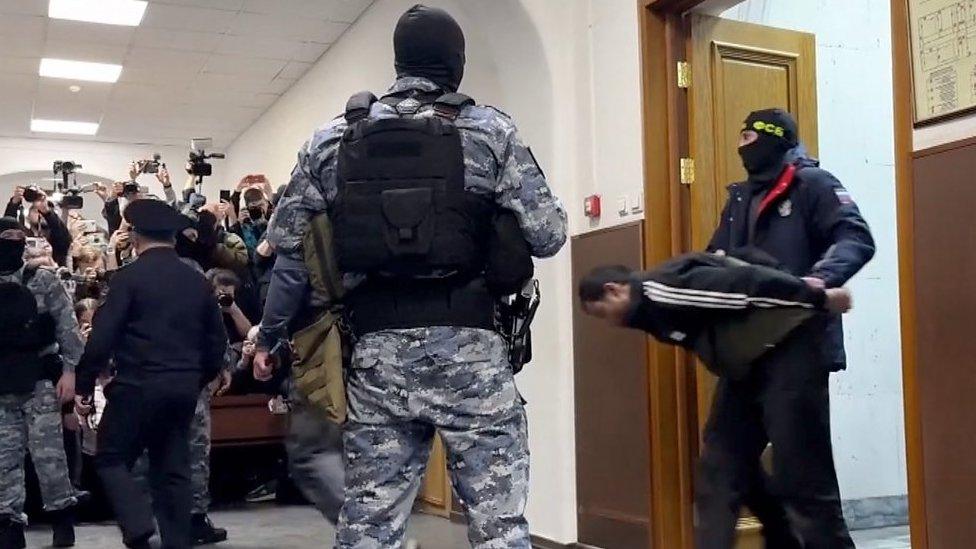
- Published25 March 2024
